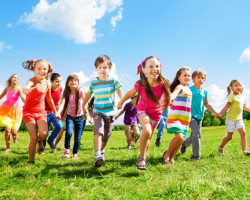Why outdoor Play is Important?

Childhood must include outdoor play
irrespective of the season. Some of our favorite childhood memories are
outdoor activities. Outdoor experiences can provide an opportunity to
explore, discover and appreciate the natural world, as well as be
active, strengthen fine and gross motor movement skills, test physical
limits, and get messy. Time spent in the outdoors should be an important
part of the daily program for all children, including babies.
Outdoor play enables the infectious agents to spread out and be dissipated; it
also enables children to get fresh air and exercise and be less
constrained than they are indoors. It is extremely important for
children to have fresh air, especially in the winter season so it
prevents them from breathing the same air circulated inside. Thus,
outdoor play develops a disposition for the outdoors, physical
activity, and the care of the environment.
Outdoor play is
extremely critical for young children in our early childhood programs
and schools. Many of the developmental tasks that children must
achieve—exploring, risk-taking, fine and gross motor development, and the absorption of vast amounts of basic knowledge—can be most effectively
learned through outdoor play. Children need opportunities to explore,
experiment, manipulate, reconfigure, expand, influence, change, marvel,
discover, practice, dam up, push their limits, yell, sing, and create.
To learn about their own physical and emotional capabilities, children
must push their limits. While we as parents and educators can promote
some of the reflective questions as below:-
How high can I swing?
Do I dare go down the slide?
How high can I climb?
Can I go down the slide headfirst?
To learn about the physical world, the child must experiment with the
physical world. Can I slide on the sand? Can I roll on grass? What
happens when I throw a piece of wood into the pond? Is cement hard or
soft to fall on? An essential task of development is appreciating how we fit into the natural order of things—animals, plants, the weather, and
so on. To what extent does nature care for us by providing water, shade, soft surfaces, and sweet-smelling flowers? And to what extent does it
present problems, such as hard surfaces, the hot sun, and thorns on
bushes? We can discover this relationship with the natural world only by experiencing it as we grow up, develop, and interact with the natural
environment.